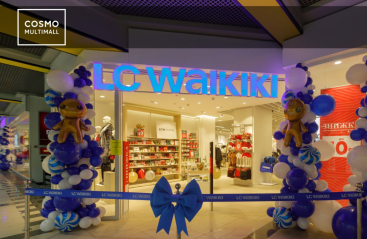Covid-19 pandemic and tough quarantine were particularly harsh for the retail trade. Hundreds of malls and dozens of thousands of stores stopped working because of restrictions. Such effects of “shock therapy” are unavoidable: the current projection for Ukraine is its economic decline by 5% this year. Rising inflation, exchange-rate depreciation, and a fall in real incomes of the population are waiting for our country. That’s why most of the retailers cannot count on a resurgence in the sales even after the quarantine ends. Many stores will be closed, and the expansion of retail chains will decrease. All this stuff will hurt the commercial real estate market.
Irreversible Consequences
“The longer the quarantine lasts, the more perceptible losses for the business,” Kateryna Vesna, the Head of the Department of consulting and agency services in the sphere of commercial real estate in the Cushman & Wakefield Company, says. The expert states that retailers and malls might face a massive loss of purchasing power of the population in the case of quarantine extension. “The next stage will be typical for any crisis: significant turnover decline and reduction in the number of stores,” Vesna adds.
According to Yevgenia Loktionova, CEO of UTG Consulting, the analysis of either optimistic or pessimistic scenarios is senseless now. Retailers and the commercial real estate market are intensively developing crisis management scenarios right now.
“Many connections have been broken, purchasing power has fallen, and the retailers have been busy optimizing their chain stores and overhauling them to work online. It’s not a big deal whether quarantine will be two weeks longer or not since the mechanism of retail transformation is already in motion. Operators have already recalibrated their algorithms of the working process, reduced their offline size, and redeployed employers for online jobs,” Loktionova notes.
According to her, the negotiation process between the retailers and lessors exists in the market, and the majority of them have reached an agreement. “Others will close their stores and leave malls. Small operators with zero power margin will also fail and reduce the number of their shops,” CEO of UTG thinks.
In turn, Kateryna Vesna adds that some retailers have ended the lease because of their worsening financial situation. It deals more with private entrepreneurs rather than chain stores. According to experts, small businesses will be the major sufferer in the current crisis. The private entrepreneurs confirm this statement. A recent poll of the European Business Association displayed that 78% of small and micro businesses will lose up to 75% of income, and 18%–22% of entrepreneurs might suspend their activities.
Taisia Lytovchenko, CEO of the consulting company Retail & Development Advisor (RDA), says that the retailers should finish the diversification between online and offline activity up to the end of quarantine. “Those, who will ignore their online presence won’t survive since the market features natural selection. If a company was an outsider before the crisis, it can hardly become successful in the future. Besides, it will be difficult for them to stay afloat under falling incomes,” CEO of RDA assures.
All right, we are going down
Olexandr Nosachenko, CEO of Colliers International (Ukraine), also thinks that previously unprofitable stores might not open after quarantine. According to him, many negotiations are over, and the retailers have adopted a low-key attitude. “Some renters continue to discuss the conditions of cooperation. However, the actual signing of the treaty may be delayed until the end of quarantine,” Nosachenko says.
On UTG’s projections, the vacancy might grow by 12% or 13% within the next three months because of the scaling down of retail chains.
“The longer is quarantine, the larger vacancy in malls is possible,” Kateryna Vesna and Cushman & Wakefield added. According to her, owners and renters will evaluate the situation and initiate the productive dialog after the opening of malls. “We allow for short-term agreements up to 3 months rather than a full review of contract terms. This happened during previous crisis periods. However, the lack of data doesn’t allow discussing market rental rates,” Vesna explains.
Olexandr Nosachenko from Colliers International fully agrees with her. He thinks that both renters and lessors will have to accept some kind of grace period of a reduction in the rental rates. “The level of the reduction can be assessed when the retailers work for several months once quarantine ends. Then, it will be possible to understand objective market reality, the retailers’ turnover, and percentage of change in the flat-rate fees,” Nosachenko says.
Developers also cannot exclude the probability of the essential reduction of rental rates.
At the same time, Maxim Gavrushyn, COO of Budhouse Group, thinks that different scenarios of rental rates dynamics are possible for various malls. “I guess, the difference between rates of successful and weak projects will grow. The strongest malls might not feel the decline if dollar exchange rates don’t go beyond ₴30. The current fall in consumer demand is significant for weak malls where rental rates might decline by 20%–30% in the USA currency. In the case of dollar exchange rates over ₴30, 100% of malls will suffer,” Gavrushyn expects and adds that the magnitude of falls will be dependable on a real currency appreciation.
On projections of RDA, the average reduction in the rental rates might reach 20%–30% at the US dollar equivalent depending on the liquidity of real estate objects. “The recovery is possible only under the improvement in the economic situation. The optimistic scenario implies full economic rehabilitation in the coming year,” Taisia Lytovchenko thinks.
Wait for another time
Covid-19 pandemic and quarantine have an impact on the pace of construction of new malls in the country. However, Cushman & Wakefield states the lack of information about the postponement of new malls’ commissioning. At the beginning of the year, five commercial facilities with a total area of over 165,000 sq. m have requested for the opening.
Nevertheless, according to Maxim Gavrushyn, the total postponement of malls, which are almost ready to work, is unavoidable. This relates to technical issues rather than to investments: disruption of supplies, logistical factors, etc.
“As far as is known, banks, which finance the construction of several of large facilities, do not renounce their obligations. For example, in the case with our mall, Nikolskyi bank confirms its involvement in the project. However, commissioning is impossible this year because of the disruption of supplies from China, Italy, and Spain,” COO of Budhouse Group says.
Kateryna Vesna from Cushman & Wakefield does not rule out that the opening of the capital mall Retroville will be postponed because of delays in the supply of building materials and repair work. “However, it doesn’t deal with the essential correction of opening since it’s not cost-effective, subject to funding for the completion of construction work. As soon as quarantine ends, the mall will accelerate its preparation for the opening,” Vesna thinks.
The expert also states that the attendance of malls might be even higher this summer than in the same period in 2019 under closed borders.
If the opening of Retroville will take place in May under the optimistic scenario, the effect of the catch-up demand after the lifting of quarantine is possible. “Even more so that people need socialization after a long period of isolation. If Retroville will use this hype to open its doors, it will feature a decent attendance,” Yevgenia Loktionova adds.
According to hers, the mall Appolo will also open in Dnipro since it is 100% full of renters. Regarding other large projects of commercial real state, they will open in subsequent years, as the renters will populate them. “At that time, the economy of Ukraine will recover from quarantine,” the expert assures.



